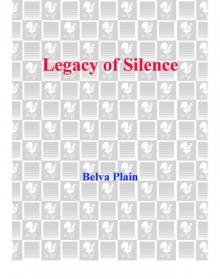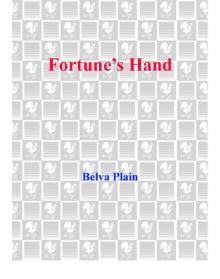- Home
- Belva Plain
The Golden Cup Page 9
The Golden Cup Read online
Page 9
Dan caught the smile. He’s afraid I’m going to be hysterical, she thought as he came to her.
“Sit down here, take off your coat, maybe you should lie down …”
She glanced at the bed and, moving past it, sat down in the chair at the window.
She felt Dan’s hand on her shoulder.
“Don’t be afraid, Hennie. We’ll have to be married quickly, that’s all.”
His voice came to her as if it were an echo; she had a queer feeling of unreality. And as if another voice, not her own, were answering, she heard, “You don’t want to.”
“Hennie, I do! For God’s sake, I do! It’s just a little sooner than I—but we’ll manage, it will be all right.” And he repeated, pleading, “Don’t be afraid.”
“All this time … you said we couldn’t afford it. And then you didn’t talk about it at all anymore.”
“I suppose I was afraid of the responsibility. The bills, the rent, I kept putting it off. Don’t think I haven’t felt guilty. It would have been better for you if you’d met someone else, not me.”
Hennie put her face in her hands. Better to have met someone else, he said. She felt blank exhaustion; everything just stopped. Everything.
“Hennie, look at me. I’m not proud of myself. Hennie, don’t cry. Please, I can’t bear your tears.”
“I’m not.” She raised her head. Like death, he looked. This had brought him down. And she felt a vindictive triumph.
“You’ll get over my tears soon enough. Miss Lucy Marston will help you do that.”
“What in the name of creation are you saying?”
“I should think it’s pretty clear.”
“She has nothing to do with this! What can you be thinking? A girl … a pretty girl … there are dozens of them … everywhere … can a man not talk to a girl without somebody’s thinking that—” he stammered, and stopped.
It would be good to believe him. Maybe it was the truth.
She stood up and, pulling the curtain aside, looked down at the lamplighter, who, moving along the street, made one sallow circle of light after the other in the growing darkness. Except for him, the street was empty.
Dan urged, repeating himself, “We shall have to be married right away, Hennie.”
She spun around.
“No. I don’t want you to marry me because we ‘have to.’ ” Something rose in her, something heedless and strong, a surge of defiance that rose above the exhaustion. “I’m worth more than that. I won’t live with a man who will throw this up to me every time we have an argument.”
“We never will.”
“Never have an argument? That’s ridiculous. How can you think that?”
“I meant I would never ‘throw it up to you.’ You have my word.”
“Your word isn’t good enough anymore.”
He asked quietly, “Then, what do you want?”
Leaning her head against the icy pane, she thought, I want it to be as it was in the beginning. I want you to look at me the way you did when we stood on the Brooklyn Bridge and you said, “I love you, we’ll have a good life.”
“Hennie, talk to me! Look at me. If you won’t marry me, what will you do?”
“I don’t know.” She heard her own laugh, an ugly broken sound. “Kill myself, I suppose.”
“My God, Hennie!”
“What difference would it make? You think I’m playacting to get your sympathy? Or threatening you, though I can’t imagine for what? No, it’s quite true that it would make no difference. My family, you, the whole world would go on, wouldn’t it, without me in it? Oh, they would cry whenever they thought of me; your conscience would torture you—for a few weeks—and it would be talked about among all my family’s friends: ‘What do you think, the De Rivera girl, they say she …’ ‘Oh, no, not possible!’ ‘Oh, yes, my dear, I heard’— Then it would all be just as before. But I, at least, would have nothing to trouble about.”
The words lifted her, making her stand tall before him. And she meant every one of them. All at once her anger made her powerful.
She horrified him. “Hennie! Ah, don’t talk like that!”
He put his arms around her and laid his cheek on her hair; his warm breath, his murmur, hovered over her head.
“Don’t talk about dying. Please. You terrify me.”
Rigidly she stood, her body resisting his tight hold. Not a word had he said about the two weeks of silence, or the indifference before that.
She became aware that he was controlling a sob.
“I know I don’t always do what I ought. I’m not good enough for you. I know that. Look up at me, Hennie, do.”
He lifted her chin so that she was forced to see the tears in his eyes.
“I never meant to hurt you. I’m not always the easiest person to get along with. I blunder, I’m not as considerate as I should be. But I’ll do better, believe me.”
“I wish I could.”
“You can! Trust me. And I’m so sorry. God, I’m so sorry!”
You could not be lying and look like that. No, you could not.
“Trust me, will you? From now on?”
She was quite still, wanting, considering, hesitating.
Then his tears broke her. The great hard lump of grief in her chest broke open, little pieces shattered and burst in her throat with cries and tears.
She wept. “I don’t want to die! I didn’t mean what I said!”
“Of course you didn’t. You’re going to live. Darling Hennie.”
He kissed her hair. Their tears ran together on her wet cheeks. His mouth came down on hers; they clung to each other. She was bathed in his heat. All the terror, the fear, the wrath and pride, melted away into a merciful relief.
“You’re so good, so brave.”
“I don’t know.”
“Well, you are. Lovely and brave.”
For long minutes they held each other. And at last Hennie smiled. Tenderly, with the familiar gesture, she pushed the stray wave from his forehead.
“I’ll take care of you, Hennie. I’ll talk to Uncle David—even if he wants to kill me.”
She was able now to laugh.
“He won’t want to kill you.”
“I’ll take care of you. Don’t be afraid of anything. I’m here. I’ll always be here.”
Yes, yes, forget everything, ask no more, go back to the beginning.
Angelique frowned. “I can’t understand the sudden haste. Or why your father is going along with Daniel’s insistence.”
“Papa’s happy for me.”
“The whole thing’s a puzzle. All of a sudden your father has such good things to say: He’s so cultured, he’s a scientist. What does that matter?”
Hennie thought, It’s because Papa knows how sad I’ve been. Or can it be possible that he suspects the truth?
Florence said, “If you’d wait until spring, we could have the winter to get properly ready. There’s no reason to hurry so, now that you’re engaged.”
“Florence, we don’t want to wait.”
“Well, then, we shall have to rush the invitations. You’ll come down my stairs, Hennie, I’ll have ropes of smilax on the banisters …”
“You’re very dear to want to go to all that trouble, but I would rather have it very small, here at home.”
“It would be beautiful in Florence’s house,” Angelique said, “I really think you should accept her offer.”
“It would make Papa happy to have a wedding here. It really would.”
“Perhaps she’s right,” Florence agreed reluctantly. “You know it has always hurt him that I wasn’t married from our home.”
Angelique sighed, and Hennie thought, She has no enthusiasm. If I were marrying someone she approved of, she would not be so tired. And she felt a queer pity because her mother was disappointed.
“At least let me help you with your clothes,” Florence said, bright with energy and kindliness. “White velvet, perhaps? Or maybe not velvet, the season’s so sh
ort for it. Brocade or watered silk would be better. Something you can wear afterward to formal dinners and get some use out of. You’re always so practical.”
“I doubt we shall be going to formal dinners.”
“Well, you’re certainly not going to hibernate in the heart of New York! So, we’ll go on Monday. Begin on Broadway with Lord & Taylor. McCreery’s after that. Walter and I have decided to give you a check to start you off.”
Hennie scarcely heard. All was being taken care of. She was being taken care of.
True, one night she woke up with pounding heart from a nightmare in which she was carrying a baby—so heavy it was!—and standing outside of Dan’s door at the top of those steep stairs, ringing and ringing, and he would not answer, and in terror she knew he would not marry her.…
Waking slowly, she felt for the ring, the chip of a diamond that had belonged to Dan’s mother. She liked to twist it on her finger, to feel it as promise and proof. Then she laid the hand on the place where the secret life lay curled and waiting, the life Dan had put there, that tied them together.
Incredible relief swept over her, like the gratitude of one who has been saved from drowning.
For a long time she lay there, smiling in the dark.
The boy Frederick, named after Dan’s father and immediately called Freddy, was unusually large and strong, Uncle David informed the family, for a seven-month baby; they were very lucky that the birth had gone so well.
The family came to the hospital, Hennie’s parents, and Florence and Walter with little Paul.
“We’ve sent a carriage to the house,” Florence said. “A dark blue British carriage fit for a crown prince.”
Hennie and Dan had already bought a perfectly good wicker carriage with a parasol, advertised for thirteen dollars in the Sears catalogue. They would simply return it. One couldn’t hurt Florence’s feelings.
“I don’t think you’ll take me to the park anymore,” Paul told Hennie.
“Of course I will! Why shouldn’t I?”
“Because you have him, and you won’t love me anymore.”
Everyone laughed, except Hennie, who reached for Paul’s hand. “I will love you both. You’ll help me with Freddy and teach him, because you’ll always be the big boy. And Freddy will love you. You will love each other all your lives.”
“But you will love him more,” Paul said seriously, “because he’s yours.”
How wise Paul is! Already he sees things as they are and can accept them. He is blessed, thought Hennie, and did not answer, but held the child’s hand until he left.
Then she was alone with Dan and the baby, who lay in a basket next to the bed. Dan knelt to bring his face on a level with hers. He had brought roses and a little cloth cat.
“You and this boy.” His voice wavered. “I don’t deserve you.”
She stroked his hair. “Don’t say that. It’s not true.”
“Yes … these last months, being together, I’ve seen all the goodness in you. I’m ashamed of some of the things I’ve done. You don’t know how I—”
Intensely moved, she whispered, “I don’t want to hear. We’re together, that’s enough.”
He straightened up. “All right. You know what I did just now? Bought concert tickets. There’s a new piece by Debussy, Afternoon of a Faun. They say it’s beautiful. We’ll have dinner and celebrate when you’re well again.”
“Well again? I’m well now, I couldn’t be better.”
When Dan went home, she was left alone with the baby; a little mound under a white blanket, he slept on his stomach, revealing only half of a mottled face and some tan hairs on a naked skull. One hand lay above the blanket; the tiny fingers were trying to grasp the smooth sheet. The lips moved, and leaning closer, Hennie could see a flicker of the white perfect eyelids; it seemed to her that he might be dreaming of food. For minutes, propped on her elbow, Hennie observed this marvel she had made.
The shifting sun poured drowsy heat into the room, and she lay back on the pillow.
Incredible that he had been alive, only a few hours before, inside her body! At the same time she was amused at herself; surely every woman, giving birth, must feel the same astonishment. As if there were anything original in it!
At any rate, he’s here and I’m here. We’re a family with a future, and I know at last who I am.
3
It is the last night of the year, indeed the last of the century, and there is in the air the splendid tension that precedes a holiday, along with the regret that comes from leaving a familiar place.
Hennie looks around at the gathered family. We were together in the last hours of the nineteenth century, we will say, years from now; we will talk about it and there will be something elegiac in the telling. For a moment she sees herself in some far-off year to come—old, sitting in some vague room in a large chair, probably a wing chair, with her feet crossed and her spotted hands folded—and shakes herself free of the image.
All evening she has had a lovely sense of well-being. All is orderly in the home; there is enough of everything but not too much. Only the silver tea service, one of several that Mama’s mother had buried in the woods during the Civil War, is out of place: rotund, filigreed, and gadroon-edged, the pots and kettles stand on the plain Mission table.
“Mission furniture?” Florence questioned when they bought it. “That square, homely stuff?”
“Dan doesn’t think it’s homely.”
“It has no true style. It’s a fad for the masses.”
“It’s made for the people, solid and simple. That’s why Dan likes it.”
She has never wanted the things that Florence and Mama want. It is wrong to own so much that one doesn’t need. Besides, clutter depresses her.
Dan has made their rooms cheerful. He has painted the walls and ceiling white, quite out of style when dark flock wallpaper is the fashion. But rich dark colors close in on you, while white opens out to the world, to sun and air. The apartment is sunny. From the kitchen window, Hennie can look down on the green yards around the prosperous homes of East Broadway, half a block distant. She has sewn sheer curtains and Dan has built bookshelves. It gives her pleasure to watch the shelves fill up, for books are their one extravagance. They look neat in their rows; neatness has always given Hennie a sense of comfort and completion.
Fortunately, there is a large closet in the back hall where Dan, who has no such need for tidiness, can toss his belongings; papers and pamphlets along with every letter he ever received spill out of shelves and boxes onto the floor. Hennie smiles to herself now; the closet is a reflection of Dan—large, careless, free, and bold.
Her eyes move to the old upright on which he has begun to give piano lessons to Freddy. Her eyes tend to rest on everything that is Dan’s. And that fine sense of well-being comes over her again.
They have eaten well: turkey and turnips, potatoes, rolls and homemade jellies. Now, with dinner over, fruit and cake are to be served on the round table in the parlor.
“An excellent dinner,” says Hennie’s mother. “I do admire the way you’ve learned to manage. I grew up not knowing how to boil water and, for goodness’ sake, everybody knows I still can’t do it! Yes, an excellent dinner, although I must say one does miss greens in this climate, having to wait till summer for a taste of something fresh. Unless, of course, one can afford hothouse vegetables and fruits. Oh, wherever did you get those?” she exclaims as Dan comes bearing a small pyramid of oranges in a bowl.
“A present from Florence and Walter,” he replies.
Angelique is pleased. “Florence thinks of everything, doesn’t she? Too bad they couldn’t be here, but they had a formal dinner to go to. There are some obligations one just can’t refuse.”
Alfie comes galloping down the hall with Freddy on his shoulders; the child’s skinny legs in their black cotton stockings dangle over Alfie’s thick chest.
“Did you know I saw elephants at the zoo?” he cries. “They eat with their nose!”
“No,” Paul corrects. “They only pick up the food with their long noses. The mouth is underneath, don’t you remember?”
Freddy laughs, showing perfect little teeth. He has a short upper lip, quick to tremble with every emotion.
“If I hadn’t seen him when he was a minute old,” Dan likes to say, “I would swear he’s not ours. He’s too beautiful.”
This is praise; yet there is something doubtful in it. Although he is fair-haired, the child is unmistakably Dan’s son; the cleft chin, the rounded forehead, and the heavy-lidded eyes are Dan’s. But he is small for a six-year-old, fearful and frail.
“I want to see the elephant again, and the monkeys,” Freddy demands now as Alfie puts him down. “Paul, you said we could get peanuts for the monkeys.”
“It’s too cold in the winter. We’ll go back to the zoo when spring comes.”
Paul is Freddy’s favorite love. After him comes Uncle Alfie. He has no bond with any child of his own age; Paul and Alfie are beloved because they are gentle with him. Hennie understands that clearly, but she does not speak of it to Dan. For some reason, perhaps because she fears Dan will not like to hear it, she keeps the knowledge to herself.
Alfie, setting Freddy down, catches Hennie’s look and gives her a jolly wink. Alfie is happy; he is almost always happy, but more so tonight, because he has brought with him the girl he wants to marry, the serene Emily, daughter of the formidable Hugheses, whose opposition to the marriage looms like a mountain. His own parents’ opposition looms, too, although it makes not quite as high a mountain.
Emily stands at the desk in the corner where Uncle David is showing her a book of Matthew Brady’s Civil War photographs. Courteously, she listens to the enthusiastic old man. Her pale hair, caught high by a tortoiseshell comb, crowns her symmetrical Saxon face; she is placid and somehow ageless. She looked like this when she was a child and will not look very different when she is old. Now, with her head bent over the book, her slender neck is pitiably tender.
It is all too complicated, Hennie thinks, when it deserves to be so simple. Only wanting to be together! Yet some force in the world seems to want to keep people apart. In this case, it is religion. In my case … I don’t know. We never talk about it. She closes her eyes for an instant, as if to blot out the thought.

 The Golden Cup
The Golden Cup Her Father's House
Her Father's House Whispers
Whispers Crescent City
Crescent City Legacy of Silence
Legacy of Silence Crossroads
Crossroads Promises
Promises After the Fire
After the Fire Tapestry
Tapestry Looking Back
Looking Back Heartwood
Heartwood The Carousel
The Carousel Fortune's Hand
Fortune's Hand Homecoming
Homecoming Random Winds
Random Winds Harvest
Harvest Evergreen
Evergreen Treasures
Treasures The Sight of the Stars
The Sight of the Stars Secrecy
Secrecy Daybreak
Daybreak Eden Burning
Eden Burning